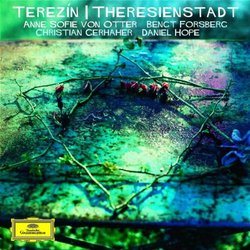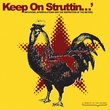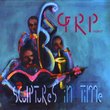| All Artists: Anne Sofie von Otter, Bengt Forsberg, Christian Gerhaher, Daniel Hope Title: Terezín/Theresienstadt Members Wishing: 1 Total Copies: 0 Label: Deutsche Gramophon Original Release Date: 1/1/2008 Re-Release Date: 3/25/2008 Genres: Pop, Classical Styles: Vocal Pop, Chamber Music, Instruments, Strings, Symphonies Number of Discs: 1 SwapaCD Credits: 1 UPC: 028947765462 |
Search - Anne Sofie von Otter, Bengt Forsberg, Christian Gerhaher :: Terezín/Theresienstadt
 | Anne Sofie von Otter, Bengt Forsberg, Christian Gerhaher Terezín/Theresienstadt Genres: Pop, Classical
The Swedish mezzo-soprano, Anne Sofie von Otter, is known as one of the most versatile stars of her generation. She is always in search of new musical challenges, whether with the songs of Cécile Chaminade or of Benny... more » |
Larger Image |
CD DetailsSynopsis
Album Description The Swedish mezzo-soprano, Anne Sofie von Otter, is known as one of the most versatile stars of her generation. She is always in search of new musical challenges, whether with the songs of Cécile Chaminade or of Benny Andersson. Here, von Otter has chosen a project with a serious and historically significant background. She interprets pieces written in the Theresienstadt concentration camp by a group of Jewish composers who were imprisoned there and yet managed to foster a rich cultural life even under the most extreme conditions. On this album, Anne Sofie von Otter is joined by one of the greatest lieder singers of today, Christian Gerhaher, and their longtime pianists Bengt Forsberg and Gerold Huber, respectively. Together they present songs by Viktor Ullmann, Hans Krása, and so-called cabaret songs. DG's recently signed violinist Daniel Hope contributes the Sonata for Solo Violin by Erwin Schulhoff. Similar CDs
|
CD ReviewsExquisite, Haunting Songs and Chamber Music from Prisoners o Terry Serres | Minneapolis, MN United States | 12/24/2007 (5 out of 5 stars) "BACKGROUND Theresienstadt (or Terezín in Czech) was the concentration camp in Czechoslovakia where members of the Jewish cultural elite were detained until sent to be gassed at Auschwitz. Among its denizens were gifted composers who wrote and performed for their fellow inmates and, increasingly, their captors. In this environment there evolved a certain permissiveness, even of music otherwise banned by the Nazis -- mostly for show. Still, Terezín has sometimes been called "Hitler's gift to the Jews." This album is a program of music, mostly cabaret and art songs, written within the camp. The liner note explains in brief the situation and fate of each composer, underscoring the tragic irony that midwived these works. The poverty of detail leaves us wanting to hear more of the horrible collective tale. This works on the music's behalf, for it sends us back to the songs themselves to learn more. THE PROGRAM This is not the first recording of music created in Terezín, even of its vocal chamber music, but this is the first that I have heard. Admittedly, such a project may seem proof to criticism and to a certain extent it is. The point becomes moot, for both the program assembled and the performances are truly flawless. I am not sure what the full range of music composed at Terezín encompassed, but it would seem fitting that smaller-scale forms such as Lieder and chamber music might well be favored among artists whose fate from day to day was uncertain. The program follows an ingenious and emotionally effective progression: from simple tunes with a folksong flavor, to songs with in the idiom of cabaret and operetta, to art songs; the music moves from simple, nostalgic and tuneful to atonal, expressionist, and tormented. Eventually, the voice itself gives way and all we hear is a beautiful, haunting, sometimes acrid sonata for solo violin. Like the music itself, variety characterizes the poetry and the indeed the languages set, as befits a way station for detained artists from throughout Europe. Found here are many texts in German and Czech, but also French and Yiddish. The German language here takes on an uncommonly tender quality, almost perversely given the identify of their persecutors (and the ensuing stereotypes). Some of the Czech songs are translations from German (Rilke) and Chinese. Needless to say, homesickness is a common theme throughout. Some of the cabaret numbers are arresting in their seeming insouciance, but others apply their tunefulness to wrily direct observations about conditions at Terezín. Nothing approaching the slapstick of "Springtime for Hitler," of course, but humor and a hint of parody are not absent. THE PERFORMANCES The performances are faultless, I really can't point to a single flaw in interpretation or technique. I tend to run hot and cold with Ms. von Otter, but here she is perfect command of her art, or rather proves herself an ideal vessel for these heartbreaking compositions. Christian Gerhaher is the most interesting of the young crop of singers who are worthy proponents of Lieder. He is somewhat like Fischer-Dieskau in tone and verbal acuity -- not necessarily a plus in my book -- and here acquits himself with distinction and conviction. The instrumentalists too are all impressive -- song accompaniments range from piano alone to various ensembles that include accordion, strings, clarinet and guitar. Like the variety of material and languages, the instrumental variety is wholly natural and adds to the expressive range. Violinist Daniel Hope is the participant who has the longest association with this music, and his performance of the closing violin sonata is accomplished -- touching and somewhat stoic, never maudlin. Despite being in release for many months now, the album has still not been distributed in the U.S. It is available for download from iTunes (but without the booklet) or from the Deutsche Grammophon web site (with booklet). If you are interested in art song, cabaret, chamber music, or Judaica, your collection cannot be without this extraordinary album. " Unspeakable Pain and Shame Giordano Bruno | Wherever I am, I am. | 06/23/2008 (5 out of 5 stars) "Approximately 144,000 Jews, mostly from Germany and Czechoslovakia, were imprisoned in the Nazi concentration camp at Theresienstadt for varying terms between 1941 and 1945. Roughly 15,000 of them were children. At least 33,000 died of contagion or starvation. 88,000 were dispatched to Auschwitz or other extermination camps, where they were gassed, usually on the day of arrival. Of the children, no more than 1100 survived. Of the total transient population, there were only 17,247 verified survivors -- 17,247 witnesses to the Holocaust. Among the Jews at Theresienstadt were some 470 Danish Jews who had not been successfully smuggled away to Sweden. The Danish government to the bold step of demanding that the International Red Cross be allowed to inspect the camp, and on June 23rd, 1944, such an inspection took place. The Germans prepared a mammoth hoax, cleaning, painting, building false fronts for shops, evacuating the sick and scrawny and cutting the population of prisoners to hastening the dispatch of thousands to Auschwitz. Theresienstadt had from the beginning been the "clearing house" for the Jewish intellectual elite, especially of Czechoslovakia. For propaganda purposes, Jews there were permitted certain cultural activities, under censorship. Thus the Red Cross was shown a thriving ghetto in which people conducted art classes, educated children, and performed music of all sorts - cabaret songs, Schubertian Lieder, modernist music not tolerated in Germany, even a children's opera. A film was made, to show the world the humanity of the Third Reich... The makers of the film were immediately sent to be executed. The composers of the music, including the opera, were soon sent to Auschwitz. Three of the composers on this CD - Hans Krasa, Pavel Haas, and Viktor Ullman - were sent to Auschwitz together on October 15th, 1944, and gassed immediately when they arrived. One inmate of the death-to-come camp at Theresienstadt was a nurse, Ilse Weber, who wrote at least 60 songs which she sang during her night rounds among the sick. The first song on this CD, in the proper German of her murderers, begins like this: Ich wandre durch Theresienstadt, das Herz so schwer wie Blei. Bis jäh mein Weg ein Ende hat, dort knapp an der Bastei. I wander through Theresienstadt, my heart as heavy as lead. Till suddenly my way ends right there at the barrier. When a throng of sick children were shipped from Theresienstadt to the death camp, Ilse Weber voluntarily accompanied them. Eyewitnesses report that in the gas chamber, she sang to the children her own lullaby, Wiegala, included on this CD. Swedish opera star Anne Sofie von Otter and baritone Christian Gerhaher sing the 25 pieces of music composed by inmates of Theresienstadt with respect and pathos. Von Otter says: "I felt and feel profoundly moved by thoughts of the cruel and terrifying fate of these inncoent prisoners, of all the human beings, young and old, whose existence was obliterated by the Nazis." This is a CD you need to own. The next time your humanity is insulted by the presence of a Holocaust-denier - there are such execrable creatures here in America - play this CD for him or her. Let's extend that: the next time any preacher of racial or religious hatred, any political scare-monger, any demonizer of immigrants, any ranter against cultural co-existence assaults your decency and intelligence, tell her or him the story of Theresienstadt." CD of the year Henry Cohen | Baltimore, Maryland USA | 03/29/2008 (5 out of 5 stars) ""CD of the year" is what Jessica Duchen called this stunningly beautiful recording at her blog on Dec. 21, 2007: [...]. She wrote, in full:
"CD of the year: Terezin, recorded by Anne Sofie von Otter with Bengt Forsberg, Daniel Hope and friends. This is one of the most extraordinary discs that's ever come my way, and the most devastating. Ilse Weber, a young nurse, volunteered to go with the sick children of Terezin to death at Auschwitz so that she could take care of them em route; her songs are the heart of this recording. It's said she sang 'Wiegala' with the children in the gas chamber. The CD also features music by Pavel Haas, Hans Krasa and the solo violin sonata by Erwin Schulhoff, plus some amazing, black-humoured cabaret songs." I will add that some of the songs are about being at Terezin (or leaving it to be murdered at Auschwitz), and some of these are unbearably sad, but others are sprightly. Some of the songs are poems unrelated to the Holocaust that composers set to music while at Terezin. The songs are sung in Czech or German, with the booklet containing translations into English and French as well. Some leave melodies running through your head, while others are more challenging, but all are wonderful. This CD is beautiful beyond words -- at least any words that I can come up with. If you'd like to learn more about this music and its composers and performances, I recommend Music In Terezin: 1941-1945, by Joza Karas. It is not much as literature, but it contains the facts about the music at this concentration camp. " |

 Track Listings (25) - Disc #1
Track Listings (25) - Disc #1


